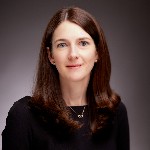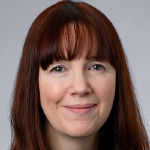Interview with Sarah House, Senior Economist for Wells Fargo’s Corporate and Investment Bank
June 1, 2023
By Michele Ocejo

Sarah House is a managing director and senior economist for Wells Fargo’s Corporate and Investment Bank. Based in Charlotte, NC, she covers the U.S. macro economy, including the labor market, inflation trends, and monetary policy. Sarah frequently speaks about the economy to the national media, including The Wall Street Journal, Bloomberg News, CNBC and National Public Radio. Prior to joining Wells Fargo in 2010, Sarah worked as a research associate for the Federal Reserve Bank of Richmond. She will be speaking at the SFNet’s Women in Secured Finance Conference on June 15.
Sarah earned a B.A. in economics from Tulane University in New Orleans and M.Sc. in local economic development from the London School of Economics. She has coauthored two books, Economic and Business Forecasting (2014) and Economic Modeling in the Post Great Recession Era (2017), both published by Wiley.
Sarah currently serves on the board for the Charlotte Economics Club, the local chapter of the National Association of Business Economics (NABE), and was president of the organization from 2020-2021. She is a member of NABE and has previously served as chair for the association’s healthcare industry committee.
Give us a bit of background on your career trajectory and how you became interested in economics.
I started to get into economics with a course in high school and then my first two semesters of college. Many of the concepts seemed to explain the world around me in a way I found intuitive. I ended up majoring in economics and was fortunate enough to find a job directly in the field at the Federal Reserve Bank of Richmond after undergrad. I worked at the Richmond Fed for a couple of years before going on to graduate school and then joining Wells Fargo. I’ve been with the Wells Fargo group for about a dozen years now, which, in some ways, feels like a long time do the “same” job, but it hasn’t felt like the same job since the economic environment is always changing.
One thing that is on everyone’s mind, of course, is inflation. Can you give us a sense of what the next six months may hold for us?
Overall, the process of quieting inflation down is likely to prove slow going. I expect we’ll see some meaningful progress on a headline basis over the rest of this year thanks to tamer food and energy prices. That will provide some much-needed relief to consumers for everyday necessities. However, the underlying trend in inflation remains quite strong, and is likely to slow only gradually. The tight labor market and unusually strong finances of households following the pandemic has kept consumer demand hanging in there, which in turn leaves businesses continuing to test pricing power.
Please tell us about Wells Fargo’s recent report: “Party of One: How Single Women Stack Up in the U.S. Economy”, which you will discuss in more detail at SFNet’s WISF Conference on June 15. Why was it conducted and what were the top couple of takeaways?
As a macroeconomist, I tend to look at the economy from a very high level, but analyzing different industries or consumer segments creates a fuller understanding of what is happening below the surface and driving longer-term trends. More than half of women are now unmarried. This shift in marital status brings with it implications for the labor supply, consumer spending and wealth building. Single women, particularly never-married women, are providing an outsized lift to the labor force, yet despite their increasing importance to the workforce, the pay gap between single men and women has been little changed over the past decade. Lower earnings create an uphill battle to build wealth and lead single women to spend less than single men and the average household.
The theme of the WISF conference is change (economic, professional and personal). Can you tell us your tips for handling the big changes life throws at you?
I’m a fan of the saying “control what you can control”. I think this saves me from spending unnecessary energy and time worrying about or trying to change things I cannot. I also try to focus on the positive aspects of change, such as how it can be stimulating and help me acquire new skills and perspectives.



.jpg?sfvrsn=f1093d2a_0)